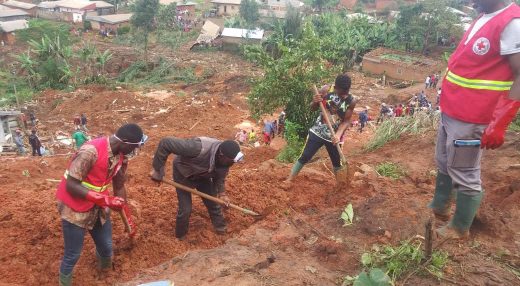30 October 2019

A landslide occurred during the night of October 28-29 in Bafoussam, in western Cameroon. It caused the deaths of nearly 50 people and engulfed nearly 80 homes.
The Luxembourg Red Cross, active in the region for two years, is working to protect local populations from the consequences of this type of event, the consequence of climate change.
Bernard Ayissi, National Director of Disaster Management of the Cameroonian Red Cross declares: “Since Monday, Cameroon has been experiencing a natural disaster in the West region, following the heavy rains which caused a landslide. So far, the local Cameroonian Red Cross has mobilized 27 rescuers to support the search for the bodies, evacuate the injured to hospitals and provide psychological first aid to the survivors. Yesterday evening 47 bodies had been found, 21 people were injured, 76 houses completely destroyed and 123 damaged. “
The shift took place in the district of Bafoussam III, around 10 p.m. Monday evening. The flow of mud also caused tremors which surprised the residents at the foot of the mountain. First aid did not reach the affected area until Tuesday morning, due to the heavy rain that hit the city for several days.
The mayor, Daniel Ndefonkou, notes that the rains have become more violent. “In previous years, it didn’t rain like that. We have to relocate people elsewhere, because we can’t build there. “
Climate change is killing innocent victims.
This tragedy unfortunately confirms the observation made on the ground by the Luxembourg Red Cross for several years now. The current deregulation leads to a multiplication of extreme climatic episodes: periods of intense drought alternate with storms and hurricanes, which in particular cause floods, as in Mozambique a few months ago, or landslides, as in this moment in Cameroon. In Africa, it is estimated that more than 70 million people are at risk due to climate change.
In Cameroon, the project carried out in the west of the country, in collaboration with the Cameroonian Red Cross, will enable 700 very vulnerable families to benefit from secure and dignified housing, outside the risk areas.